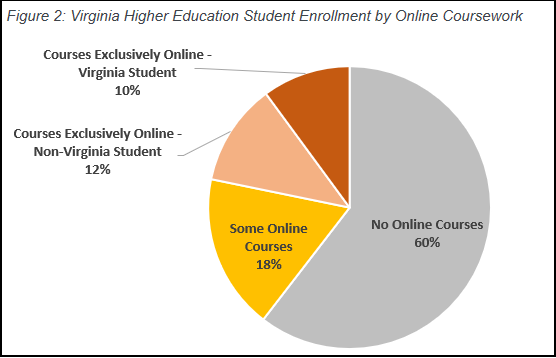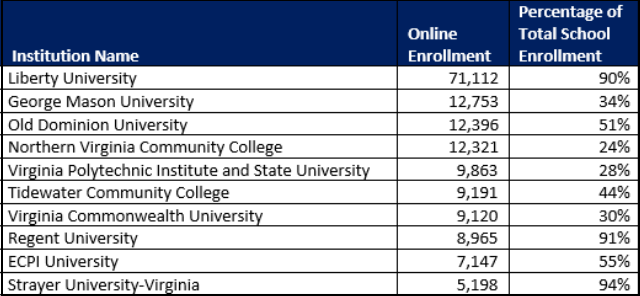Distance learning was already on the rise at Virginia higher-ed institutions before the COVID-19 epidemic prompted college administrators to send students home and complete their classes online. Many faculty and administrators are hoping that they can revert to the status quo of good ol’ fashioned face-to-face classes when the epidemic subsides. But will normalcy be restored? Or will the flirtation with online classes accelerate the spread of distance education?
Spencer Shanholtz with the University of Virginia’s Demographics Research Group addresses the issue on the StatChat blog. The percentage of Virginia students taking at least one online course, he writes, was 40% in 2018 — a 5 percentage-point increase since 2012, even while overall enrollment declined slightly.
While online learning has increased, he observes, most of that increase has occurred at a handful of institutions — led most notably by Liberty University. Other notable players include George Mason University, Old Dominion University, Virginia Tech and Virginia Commonwealth University. Notably absent from the list of schools with the largest online enrollments: the University of Virginia and the College of William & Mary.
Here’s my prediction: The COVID-19 epidemic represents a watershed. Online learning will accelerate. But that shift will not occur uniformly across all higher-ed institutions. Some will cling to their lecture halls and symposium rooms. Others, seeing little to gain from returning to the status quo, will make the transition.

The bitter clingers will tout the benefits of face-to-face education and the residential campus experience. Those benefits are real, and not to be under-estimated. The question is, in a world of the relentlessly rising cost of higher education, how much will people be willing to pay for those advantages? Will many parents cry out, no mas, we’re willing to pay for instruction and learning, but we’re not willing to pay for gourmet food, for luxury dormitories, for athletic programs, for drunken frat parties, for a hook-up culture where my kid catches STDs, for the PC indoctrination, or for other accouterments of the modern college experience?
Once upon a time Virginia had a fine system of commuter colleges — GMU, VCU, ODU, and the like. Kids attended those colleges to learn skills and earn credentials that would get them jobs. But university presidents and board of visitors weren’t happy presiding over commuter colleges. They wanted to increase institutional prestige. And that meant going on academic and dormitory building sprees, and investing in amenities that would attract students — not the kind of students they had been educating, but affluent kids from in-state, out-of-state and abroad whose parents were financially able to pay the full freight. While Virginia’s community colleges do offer two-year degrees, the state no longer has no longer has colleges dedicated to providing an affordable, four-year non-residential experience.
The irony is that a majority of college students don’t graduate in four years. A sizeable percentage don’t graduate in six years! More than 40% of low-income Virginia students do not graduate within six years, which means that, in all likelihood, they never graduate. More than 20% of “high” income students don’t graduate within six years, according to State Council of Higher Education for Virginia (SCHEV) data. For lower-income students especially, finances are a significant barrier to college attendance.
Which course of study is more appropriate for these students — a residential experience in which room, board & mandatory student fees are heaped upon the cost of tuition, or a distance learning experience in which the student pays for tuition only?
As distance learning proves itself as a viable way to learn certain bodies of content and acquire certain kinds of skills, more and more Virginians will avail themselves of that option. Institutions that cater to them will prosper. Many of those who refuse to will suffer.


Leave a Reply
You must be logged in to post a comment.